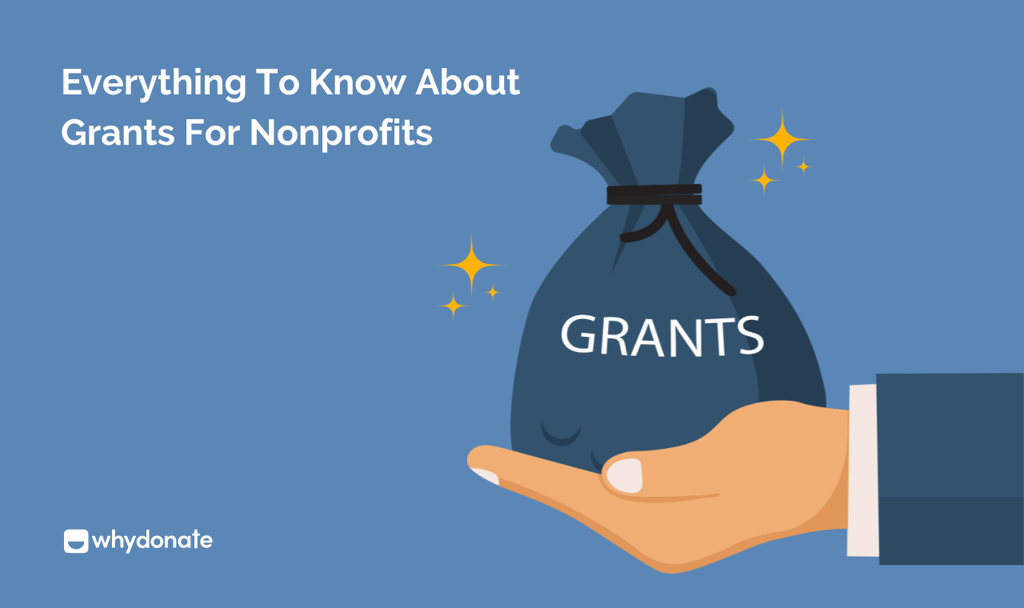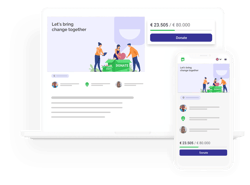Table of Contents
What Are Nonprofit Grants?
Grants for nonprofits are funds provided by organizations, government agencies, or foundations to support nonprofit organizations’ activities and initiatives. These grants are typically awarded through a competitive application process and can be used for various purposes, such as program development, capacity building, research, and community outreach. Nonprofits can apply for grants to obtain financial resources to further their mission and achieve their goals.
Grants are a crucial source of funding for nonprofits that aim to make a positive impact in their communities. These grants are financial resources provided by various entities, such as foundations, corporations, and government agencies, to support nonprofits’ work. Nonprofits can use grants to fund specific projects, expand their programs, or build organizational capacity.
Who Can Apply For Nonprofit Grants?
To obtain a grant, nonprofits typically have to submit a grant proposal that outlines their mission, goals, and the specific project or initiative they seek funding for. The grant application process often involves writing a detailed proposal, providing a budget, and demonstrating the organization’s capacity to effectively implement the proposed project.
Nonprofit grants can cover a wide range of areas, including education, healthcare, environmental conservation, social services, arts and culture, and more. They can support activities such as research, program development, community outreach, capacity building, and advocacy efforts.
Securing grants for non profits can be highly competitive, as many organizations apply for limited funding opportunities. Nonprofits need to carefully research and identify potential grant opportunities that align with their mission and programs. They should also tailor their grant proposals to meet the specific requirements and priorities of each funding organization.
Start A Fundraiser For Your Nonprofit In Minutes!
Commons Types Of Nonprofit Grants
Common types of nonprofit grants include:
- Corporate Grants For NonProfits:
Corporate grants for nonprofits are financial contributions provided by corporations to support the work of nonprofit organizations. These grants are an important source of funding for nonprofits, as corporations often have specific philanthropic initiatives and goals they aim to achieve through their giving programs.
Many corporations prioritize sustainability and environmental stewardship. They may offer grants to nonprofits working on environmental conservation, renewable energy, waste reduction, or other initiatives that align with their environmental goals. Corporations often support educational initiatives, particularly in the fields of science, technology, engineering, and mathematics (STEM).
Some corporations also encourage their employees to engage in volunteer activities and may provide corporate grants for nonprofits to support employee volunteer programs as their corporate community grants program. Building relationships with corporate representatives and demonstrating the impact and outcomes of existing programs can also increase the chances of securing corporate grants.
- Project Grants:
These grants provide funding for specific projects or initiatives that align with the grantor’s priorities. Nonprofits can apply for project grants to support activities such as community development projects, research studies, arts and culture programs, or environmental conservation efforts.
- Capacity Building Grants:
These grants aim to strengthen nonprofit organizations’ overall capacity and sustainability. They can provide funding for activities such as staff training, infrastructure development, technology upgrades, strategic planning, and organizational development.
- Operating Grants:
Operating grants provide funding to cover nonprofit organizations’ day-to-day expenses and operational costs. These can include salaries, rent, utilities, and other administrative expenses. Operating grants are essential for organizations to maintain their ongoing programs and services.
- Program Development Grants:
These grants support the creation and expansion of specific programs or services offered by nonprofit organizations. Nonprofits can use program development grants to launch new initiatives, enhance existing programs, or address emerging needs within their communities.
- Capacity Building Grants:
These grants aim to strengthen nonprofit organizations’ overall capacity and sustainability. They can provide funding for activities such as staff training, infrastructure development, technology upgrades, strategic planning, and organizational development.
- Research Grants:
Research grants are awarded to nonprofit organizations conducting studies or research in various fields. These grants can support research projects focused on healthcare, education, social sciences, environmental studies, and more.
- Capital Grants:
Capital grants are provided to nonprofit organizations for major capital projects. These projects may include building or renovating facilities, purchasing equipment, or expanding organizational infrastructure.
It’s important for nonprofits to carefully assess their funding needs and target grants that align with their mission and goals. They should also thoroughly research grant opportunities, review application guidelines, and craft compelling proposals to increase their chances of securing funding.

Pros And Cons Of Grants You Must Know
Now, let’s have a look at some pros and cons of grants:
Pros of Nonprofit Grants:
- Financial Support: Government grants for nonprofit organizations provide a valuable source of funding for organizations that may not have sufficient resources to carry out their mission and programs. Grants can help cover operational costs, fund specific projects, and support capacity-building initiatives.
- Validation and Credibility: Being awarded a grant from a reputable foundation or organization can enhance the credibility and reputation of a nonprofit. It serves as a validation of the organization’s work and can attract additional support from donors, volunteers, and community partners.
- Program Expansion and Innovation: Grants can enable nonprofits to expand their programs, launch new initiatives, or implement innovative approaches to address social issues. The funding provided through grants allows organizations to take risks and explore creative solutions to community challenges.
- Networking and Collaboration Opportunities: Grant opportunities often come with networking and collaboration opportunities. Nonprofits can connect with other organizations, experts, and funders within their sector, leading to potential partnerships, shared resources, and knowledge exchange.
Cons of Nonprofit Grants:
- Competitive Application Process: The process of securing grants for nonprofits is highly competitive. Many organizations apply for limited funding opportunities, making it challenging to stand out among the pool of applicants. This can require significant time and effort invested in crafting compelling grant proposals.
- Restrictive Funding Guidelines: Grants often come with specific guidelines and restrictions on how the funds can be used. Nonprofits may face limitations on the duration of the project, the geographic area served, or the types of activities that can be funded. This can limit the organization’s flexibility and autonomy in addressing community needs.
- Reporting and Accountability: Grant funding usually requires nonprofits to provide detailed reports and demonstrate the impact of the funding received. This can involve extensive reporting requirements, monitoring, and evaluation processes, which can be time-consuming and resource-intensive for organizations with limited staff and capacity.
- Dependency on External Funding: Nonprofit grants provide a significant portion of funding for many organizations. However, relying solely on grants can create a sense of uncertainty and instability, as funding may not be guaranteed in the long term. Nonprofits need to diversify their funding sources to ensure sustainability.
- Limited Flexibility: Grants often have specific objectives and outcomes that must be achieved. This can limit the flexibility of nonprofits to adapt and respond to emerging needs and priorities within their communities. Nonprofits may need to align their programs and activities with the requirements of the grant, even if it deviates from their original mission or strategic direction.
Nonprofits must carefully consider the pros and cons of grants and assess how they align with their organizational goals, capacity, and long-term sustainability plans. They should also explore other funding avenues to diversify their revenue streams and reduce dependency on grants alone.

WhyDonate And Grants For Nonprofits
Crowdfunding and nonprofit grants are both popular methods of raising funds for nonprofit organizations, each with its own advantages and considerations. However, crowdfunding platforms are much less work compared to nonprofit grants for any fundraising process. Crowdfunding encourages direct engagement with individual donors. It allows nonprofits to share their mission, story, and impact directly with supporters, fostering a sense of connection and involvement. Donors may feel more personally invested in the success of the organization and its projects.
WhyDonate is one of the best platforms to raise money for any nonprofit. The fundraising platform provides a way for nonprofits to reach a wide audience and engage with potential donors, regardless of their geographical location. It allows organizations to tap into the power of social networks and online communities to raise funds.
WhyDonate offers flexibility in terms of the types of projects or initiatives that can be funded. Nonprofits can use the fundraising website to support specific campaigns, events, or even general operating expenses. It provides an opportunity for organizations to pursue innovative or time-sensitive projects that may not fit within the parameters of traditional grant funding.
Through WhyDonate, you can make successful crowdfunding campaigns go viral, attracting attention and support from a wide range of individuals, including those who may not have been familiar with the nonprofit before. The viral nature of crowdfunding can help raise awareness about the organization’s mission and expand its donor base.
Find Other Funding Ways For Nonprofits Here –
- Google Ad Grants For Nonprofits
- Pinterest For Nonprofits
- Adobe For Nonprofit
- Everything About Nonprofit Funding Models
- 6 Approved Free Online Fundraising Software for Nonprofits

Consider Best Grants For NonProfits
Both crowdfunding and best grants for nonprofit applications require significant time and effort. Crowdfunding campaigns need to be well-promoted and actively managed, engaging with donors throughout the process. Grant applications involve thorough research, proposal writing, and adherence to specific guidelines. It is important for nonprofits to assess their funding needs, align them with their goals and capacity, and carefully choose the fundraising methods that best suit their organization’s needs.

















